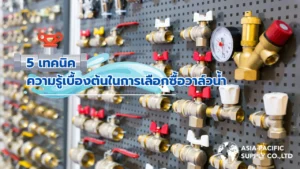
5 techniques and basic knowledge for selecting water valves
Water valves are important equipment in piping systems, whether in households, buildings, or industrial plants. Valves control the opening and closing of valves or adjust the flow rate of fluid to suit the application. If the wrong type is selected or used in the wrong location, it may result in inefficient system operation or damage to various equipment.
This article will introduce you to 5 basic techniques you should know so you can make professional purchases.
1. Know the types of water valves clearly.
The first thing is to understand that there are many different types of water valves, each with its own unique function and usage. Therefore, choosing the right one for your application is essential. Common types of water valves include:
Therefore, before purchasing, make sure to inquire about the type of valve and whether it is suitable for the system you will be using. This will ensure that you choose the one that is most suitable for your application and provides the most efficiency.
2. Consider the type of fluid in the system.
The valve system must be used in conjunction withFluid flowing through the valve Which fluidunnecessaryI willMust be clean waterAlways It might beGot both hot water cold water Water containing sediment or chemical contaminants Even when used with the systemWastewater or recirculated water in industrial systemsDifferent fluids require different valve and seal materials, such as: Water that hashothighHigh heat resistant valves should be used. As forYellow or StanLeS andFor fluids containing chemicals, a valve with a lining should be selected. Teflon (PTFE) or anti-corrosion materials
3. Check the operating pressure and temperature.
Each valve model has its own pressure and temperature limits. If not selected properly, the valve may leak or be damaged quickly. Here are some things to check :
It is recommended to select a valve that can withstand a slightly higher pressure than the actual requirement for safety and to prolong its service life.
4. The material of the valve affects its durability.
The material of the valve body and the material of the seal are another factor that determines the service life and suitability for each type of fluid. The summary is as follows:
Another important thing to consider before purchasing is to check the seal material, such as EPDM, NBR, or PTFE, as these are the areas that deteriorate the fastest.
5. Installation location and control format
The location of the valve installation affects the choice of control type and style. For example, a valve in a hard-to-reach area should be chosen with a long lever or one that can be controlled remotely. If an automation system is desired , a valve with an electrical or pneumatic control system should be chosen. For applications that require frequent opening and closing, a valve with a long lifespan and low maintenance should be chosen.
If you are looking for high quality valves For water pumping systems and waterworks in the industrial sector agriculture Or general use The Asia Pacific Supply team is happy to provide advice with over 29 years of experience in importing and distributing valve system equipment to help you make the most appropriate purchase.
